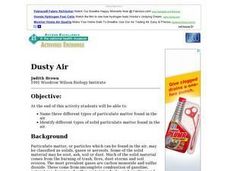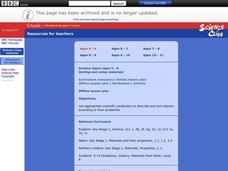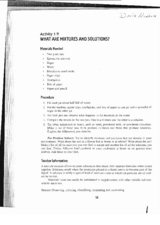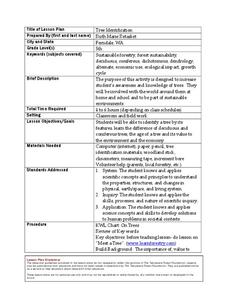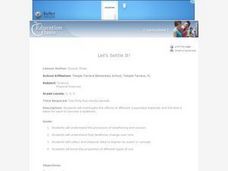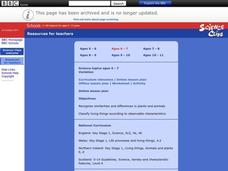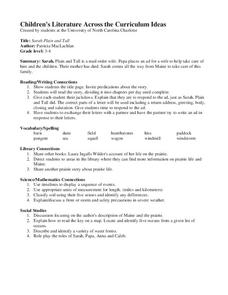Curated OER
Cows, Worms, and Compost
Students study decomposition. In this decomposition lesson, students discuss the background information about decomposition. Students then complete the 'Chew It Twice' worksheet.
Curated OER
Sorting and Using Materials
Learners explore materials and their properties. In this matter lesson plan, students identify objects and describe their properties. Learners test and sort materials using an interactive whiteboard, followed by a group discussion of...
Curated OER
Permafrost: Permanently Frozen Ground
Students explore permafrost. In this 3 states of matter lesson, students identify characteristics of solids and liquids. Students observe water and soil melting and freezing at various temperatures. Students make predictions about a...
Curated OER
Collecting Compost
Students observe a composting box. In this soil lesson plan, students create a composting bin by using a bin, newspaper, worms, and food scraps. Students create a composting food web.
Curated OER
Molecular Origami
Students construct an origami models of different molecules. In this chemistry lesson, students explain what expansive soils are made up of. They discuss what happens when this expansive soil expands or shrinks.
Curated OER
Whodunit?
Students observe the geometric patterns on fingerprints. They classify fingerprints into groups and obtain prints from surfaces.
Curated OER
Dusty Air
Students discover the types and amounts of particulate matter found in the air. They collect particulates using a Petri dish coated with Vaseline then classify and count the collection under a stereoscope.
Curated OER
Salad Party
Students bring different plant parts in order to make one big salad. They observe each part and classify it.
Curated OER
Recyclers to the Rescue
Fifth graders examine the concept of the food chain and define producer, consumer, herbivore, carnivore, and omnivore. They draw a food chain for a mouse and discuss the different organisms involved in the chain, and conduct an...
Curated OER
Sorting and Using Materials
Young scholars practice sorting and classifying objects. In groups, they choose a variety of materials and describe how each one looks and feels. They must agree on how to classify each object and share their groupings with the class. ...
Curated OER
Sorting
Students identify how objects can be sorted or classified for easy access. In this sorting activity, students will investigate how letters, numbers, and symbols are used in sorting and classifying.
Curated OER
Amoeba This!!! Amoeba That!!!
Students investigate protozoa. In this protozoa lesson, students identify and classify different types of protozoa using different ecological samples and protozoa charts.
Curated OER
Forest Ecology
Students examine the different plants and animals in British Columbia. In this forest ecology lesson students explore how ecosystems work, classify animals and investigate food webs and chains.
Curated OER
What Are Mixtures And Solutions?
Students explore mixtures and solutions. In this chemistry lesson plan, students will add different ingredients to jars in order to classify them as mixtures or solutions. There is also a nail balancing activity that can be done at home.
Curated OER
Tree Identification
Students list four ways to identify trees. In this tree identification instructional activity, students use tree identification techniques such as leafs, bark, wood grain, soil type, and climate to create tables and graphs.
Curated OER
Exploring Great Salt Lake
Fourth graders go on a field trip to make observations about plants in the Great Salt Lake area. They make observations about the environment and record the types of pants that are living there. The lesson is to introduce the concepts of...
Curated OER
Science Excursion: Cover Mapping Land
Students study remotely sensed images and topographic maps to classify land cover types in their watershed area. They take samples in the watershed area to interpret the images.
Curated OER
Let's Settle It!
Students investigate and record data about sedimentation rates. They make a sedimentation bottle using aquarium gravel, sand and potting soil. They discuss the sedimentation rates that they see in their bottles.
Curated OER
Variation
Students participate in an online lesson to reinforce the similarities and differences in plants and animals. They classify living things according to observable characteristics.
Curated OER
Where in the Usa is Radon?
Pupils determine the areas of New Jersey and the US that are likely to have high radon concentrations. Students draw a map of their own neighborhood that show soil associations in their neighborhood.
Curated OER
Where is Water Found?
Fourth graders examine the amount of water and its distribution on Earth. As a class, they brainstorm a list of where water can be found and classify the places according to salt water, fresh water or glaciers. They estimate how much...
Curated OER
Sarah Plain and Tall
Learners read the story, dividing it into chapters per day until complete. They respond to the ad, just as Sarah, Plain and Tall did and use the correct parts of a letter used including a return address, greeting, body, closing and...
Curated OER
Making Regolith
You may not be able to take a field trip to the moon, but that doesn't mean your class can't study moon rocks. Using graham crackers as the moon's bedrock and powdered donuts as micrometeorites, young scientists simulate the creation of...
Cal Recycle
Conserving Natural Resources
Trying to plan an engaging elementary science unit on natural resources? Conserve your energy! This five-part series of lessons and hands-on activities has exactly what you need to teach young scholars about the importance of conservation.








